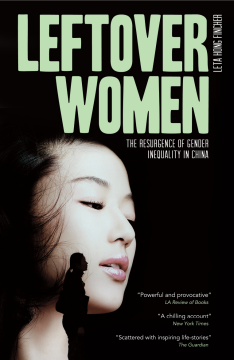
Additional Information
Book Details
Abstract
‘Scattered with inspiring life-stories of courageous women.’
The Guardian
In the early years of the People’s Republic, the Communist Party sought to transform gender relations. Yet those gains have been steadily eroded in China’s post-socialist era.
Contrary to the image presented by China’s media, women in China have experienced a dramatic rollback of rights and gains relative to men.
In Leftover Women, Leta Hong Fincher exposes shocking levels of structural discrimination against women, and the broader damage this has caused to China’s economy, politics, and development.
‘Leta Hong Fincher's subject – researched through statistical analysis, sociological surveys and extensive first-hand interviewing – is the toxic vitality of sexism in China today…[Leftover Women] is scattered with inspiring life-stories of courageous women who have faced down appalling discrimination.’
The Guardian
‘A chilling account of the pressures on Chinese strivers… One hopes that Leftover Women will soon be translated into Chinese, as it is likely to resonate deeply with urban educated women. It seems the party has forgotten the Mao-era dictum: “Women Hold Up Half the Sky.”’
The New York Times
‘Makes a powerful — and provocative — argument that China’s female shortage, far from empowering women, has actually resulted in a situation where urban women’s rights are increasingly imperilled…Leftover Women [will] leave readers coldly angry.’
LA Review of Books
‘Making the most of her experience as a journalist and her training in sociology, Leta Hong Fincher draws on previous breakthrough works in Chinese gender studies and her own interviews, while proving equally at home summarizing statistics and telling poignant tales of individual experience. The result is an engagingly written, thought-provoking work on a crucially important but often overlooked subject. Essential reading.’
Jeffrey Wasserstrom, author of China in the 21st Century: What Everyone Needs to Know
‘In lively and accessible prose, Hong Fincher demonstrates conclusively that urban professional women have been disproportionately disadvantaged during China’s breakneck economic development and largest wealth accumulation in human history. Hong Fincher exhaustively cites media, government statistics, her own interviews, and her Weibo survey results to substantiate the fact that gender inequality in China has reappeared with a vengeance and shows no signs of abating any time soon.’
Rebecca E. Karl, New York University
‘Cast aside what you think you know about the “empowered” women of China today. Modern Chinese women are under pressure in a society that often locks them out of social equality, property rights, and legal protection from domestic abuse. This is the reality that China scholar Leta Hong Fincher puts forward in her study of resurgent gender inequality in China. Her book is a well-researched and riveting read, including a number of gripping personal accounts straight from China’s so-called “leftover women”. For any curious observer of China or women’s issues, this is one to read.’
Kristie Lu Stout, anchor/correspondent, CNN International
‘A brilliant, compelling, and innovative study of contemporary China and one of the most important sociological inquiries into the political economy of gender. Leta Hong Fincher’s richly detailed research and critical analysis of gender politics in Leftover Women provide an indispensable resource for anyone who wants to understand the key socio-economic transformations in post-socialist China.’
Lydia H. Liu, Columbia University, co-editor of The Birth of Chinese Feminism
Leta Hong Fincher is an award-winning former journalist who has been published in a number of magazines and newspapers, including the New York Times.
Table of Contents
| Section Title | Page | Action | Price |
|---|---|---|---|
| Cover | Cover | ||
| About the Author | ii | ||
| Title Page | iii | ||
| Copyright | iv | ||
| Dedication | v | ||
| Contents | vii | ||
| Introduction | 1 | ||
| 1. China’s “Leftover” Women | 14 | ||
| How the State Stigmatizes Single Educated Women in Their Late Twenties | 14 | ||
| Marriage, Social Stability and Upgrading “Population Quality” | 20 | ||
| Dismantling Women’s Gains of the Past | 35 | ||
| 2. How Chinese Women Were Shut Out of the Biggest Accumulation of Real-Estate Wealth in History | 44 | ||
| Homes Worth US$30 Trillion, Most Registered in Men’s Names | 45 | ||
| “He’s Going to Be the Landlord and I’ll Pay Him Rent” | 51 | ||
| “I Have Been Cast Aside by the Law” | 63 | ||
| 3. China’s Giant Gender Wealth Gap | 75 | ||
| Why Parents Tend to Buy Homes for Sons but Not Daughters | 78 | ||
| How State Promotion of Marriage and New Households Fuels Real-Estate Mania | 92 | ||
| Why Real-Estate Wealth Is More Important Than Income for Chinese Women | 103 | ||
| 4. Back to the Ming Dynasty | 109 | ||
| The Golden Age for Women’s Property Rights: 1,000 Years Ago? | 110 | ||
| Women’s “Liberation” in the Republican and Communist Revolutions | 118 | ||
| Marriage and the Erosion of Women’s Property Rights in the Post-Mao Era | 129 | ||
| 5. Wives Caught in China’s Web of Abuse | 140 | ||
| “Don’t Expose Family Ugliness” | 141 | ||
| “The System Is Designed to Make You Give Up” | 148 | ||
| “Why Should I Give Her a Divorce? We’re Family” | 158 | ||
| 6. Fighting Back | 165 | ||
| Women’s Resistance in the Authoritarian State | 165 | ||
| Gender and LGBTQ Activism | 178 | ||
| The Future of Women’s Rights in China | 184 | ||
| Acknowledgments | 191 | ||
| Notes | 195 | ||
| Index | 208 |
